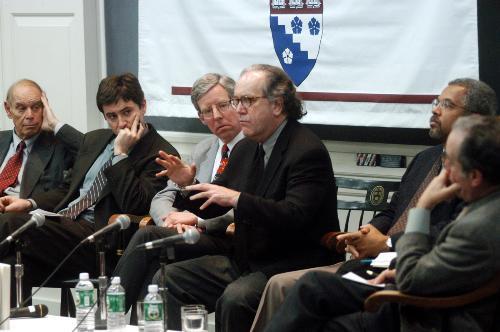
News
Pro-Palestine Encampment Represents First Major Test for Harvard President Alan Garber

News
Israeli PM Benjamin Netanyahu Condemns Antisemitism at U.S. Colleges Amid Encampment at Harvard

News
‘A Joke’: Nikole Hannah-Jones Says Harvard Should Spend More on Legacy of Slavery Initiative

News
Massachusetts ACLU Demands Harvard Reinstate PSC in Letter

News
LIVE UPDATES: Pro-Palestine Protesters Begin Encampment in Harvard Yard
Experts Debate Public Schools

Twenty years after the publication of a groundbreaking report that sparked national education reform, education experts said the U.S. school system has still not adequately improved public education standards last night in a panel at the Askwith Forum at the Graduate School of Education (GSE).
“We’re over-investing in measurement and testing,” GSE Professor Richard F. Elmore told around 200 guests. “We’re playing a very dangerous game.”
The forum marked the release of the book, A Nation Reformed?, a 20-year update of the 1983 report, “A Nation at Risk,” which proclaimed a dire need for rigorous educational reform.
Several contributors to the new book and Mallinkrodt Professor of Physics Emeritus Gerald Holton, who co-authored the original report, stressed that “A Nation at Risk” was a revolutionary step in education reform.
“Improving education was not on the nation’s front burner in those years,” Holton said. “I saw the whole thing slipping into oblivion. [Former President Ronald Reagan] attempted to dismantle everything that was dear to me.”
Holton said Reagan commissioned him and other education specialists to write a report advocating for school prayer and vouchers.
But after two years of research, the group instead came out with recommendations to strengthen school curricula and tighten teaching standards, mandating a greater federal focus on education.
The report led to a widespread outcry over the state of the school system and spurred many states to reform their education standards.
While they recognized the educational improvements made in response to “A Nation at Risk,” members of last night’s panel emphasized the need for yet higher standards in curriculum, more effective federal policy and better teaching.
“There is an attitude abroad in the land that these kids are not going to be able to reach high standards,” said Jeff Howard ’69, head of the Efficacy Institute, which is devoted to creating quality education for all students. “We’ve got to see the terms for our educators and our parents to become proficient at the art of educating children.”
Panelists criticized the recent federal “No Child Left Behind Act” which mandates a strict system of accountability through standardized testing.
“It’s the most prescriptive, most intrusive piece of educational legislation we have seen,” said Robert B. Schwartz, a GSE lecturer and the former president of Achieve, a non-profit organization dedicated to improving education standards.
Calling educational officials “tone-deaf,” Elmore proposed reallocating resources within the school system instead of increasing funds for testing.
But former Boston principal Kim Marshall ’69 said standardized testing is necessary to ensure accountability and unify national curricula.
“There still isn’t the clarity of what a second-grader needs to know,” he said. “Let’s have a national curriculum.”
Holton said students are “the most important resource of the nation” and called for an increased “professionalization” of teachers to reflect the importance of education.
“[Students] are the least-valued part of society,” he said. “Our top priority should be a constitutional amendment that will put the children where they need to be.”
—Staff writer Claire A. Pasternack can be reached at cpastern@fas.harvard.edu.
Want to keep up with breaking news? Subscribe to our email newsletter.
